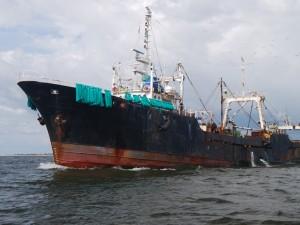Gulf of Guinea: Is pirate fishing the cause of piracy and is it becoming the new Somalia? – By Pieter Tesch

 Last year London based international maritime organisations such as the International Maritime Organisation (IMO) and International Maritime Bureau (IMB) began to sound the alarm about the increasing threat of piracy in the Gulf of Guinea, suggesting that the region could, if no action was taken, become a “˜second Somalia.’
Last year London based international maritime organisations such as the International Maritime Organisation (IMO) and International Maritime Bureau (IMB) began to sound the alarm about the increasing threat of piracy in the Gulf of Guinea, suggesting that the region could, if no action was taken, become a “˜second Somalia.’
More recently there were reports of attacks and attempted attacks on large merchant vessels in the Blight of Benin, where there is already a tradition of low intensity piracy linked to the unrest in Nigeria’s Niger Delta. This has lead the governments of Nigeria and Benin to initiate joint naval patrols to combat piracy, and further northwest off Guinea Conakry, where there has been no real tradition of organised maritime robbery.
The narrative put forward by many Somali representatives, including in the Diaspora and supported by advocacy and marine environmentalist campaigners against so called “˜illegal, unreported and unregulated’ fishing (IUU,) is that the origins of Somali piracy lie in Somali coastal communities defending themselves against pirate fishing or poaching by “˜unscrupulous’ international trawler firms and equally unscrupulous “˜flag of convenience’ nations, or against illegal dumping of toxic waste following the collapse of the Barre regime in 1991.
This narrative is challenged by a number of analysts, for instance Dr Martin Murphy of the Washington DC based Atlantic Council who has made a study of piracy and counter piracy, not only off Somalia, but also in South East Asia, off Bangladesh and in the Gulf of Guinea.
While most pirates could be described as (ex) fishermen in the above mentioned regions, this was not true for Somalia, where piracy should be seen as an extension of land based warlord predation – attacking non fishing vessel from the onset with focus on ransoms for crews and vessels.
While there is a Somali maritime tradition dating back to pre-colonial trading along the Swahili corridor, there is no large scale Somali tradition of artisanal fishing as for instance along the Guinea littoral. Somalis as nomads and pastoralist don’t by and large like fish or to fish, though their waters are probably as rich as those off Namibia in the South Atlantic and to the north off Mauritania in the central eastern Atlantic.
Today both Namibia and Mauritania have become the most successful and well managed African fishing nations by selling and managing fishing licences within economic exclusive zones (EEZ).
Mauritania is set apart from its Atlantic neighbours to the south, with possibly its immediate southerly neighbour Senegal as the exception, as from Guinea Bissau to Cameroon fisheries management and enforcement in their EEZs is virtually absent.
In Mauritania, however, the licences for the seagoing mainly wooden canoes with outboard motors and mostly owned and crewed by Senegalese are held by Mauritanians. Under Mauritanian law only Mauritanian flagged vessels under 29 metres can fish in the internationally recognised 12 inshore fishing limit.
Most of the Mauritanian catches, whether caught by foreign licensed trawlers or the artisanal sector, are exported, not only to Europe and Asia for its low volume but high value demersal (bottom water) species such as octopus, prawns and tropical round and whitefish, but also to its African neighbours for mainly its high volume but low value small pelagic (mid water) species such as mackerel, horse mackerel, sardines and sardinella. These are consumed not only by coastal communities, but are estimated to constitute up 50 percent of total animal protein intake of the populations of some Ecowas countries.
Most coastal Ecowas countries seem to regard their fisheries either as a source of revenue from selling licences in the 200 EEZs, and the artisanal coastal fisheries as a subsistence buffer for coastal communities when, due to natural causes and/or civil unrest, local populations have reduced access to land based food resources.
But why would any reputable international trawler firm want to buy a licence and fish, under for instance the recently renewed EU Guinea Bissau fisheries treaty, if fisheries management and enforcement are lacking, let alone if security cannot be guaranteed?
Should it therefore be a surprise that the waters and coastline of the Guinea littoral seem to have become a “˜safe haven’ not only for drugs and human trafficking, gun running, large scale fish poaching or “˜pirate’ fishing (and last but not least for piracy)?
Analysts like Dr Murphy stress that the solution for combating piracy lies not with the gunboats of foreign navies at sea but in creating conditions for stability on land.
IUU is not the root cause of piracy in Africa but it is, like piracy, caused by failing or failed state structures that cannot guarantee stability on land and on sea. Anti IUU activists hold too romantic view of the artisanal fishermen in their canoes, creating a narrative and imagery of them being “˜good guy’ victims of the “˜bad guy’ international industrial fishermen.
Large pelagic freezer trawlers pioneered the targeting of small pelagic species off Africa when there were no onshore processing plants available. The time has probably come for them to leave the EEZs, rationalise the international fleet and concentrate on the High Seas outside the 200 mile zones, but they should be replaced within Africa’s EEZs by other types of trawlers that can fish and land fish from outside the 12 mile inshore zone . Within this zone the artisanal fleet should be rationalised and modernised as well so that it can supply proper onshore processing plants.
That would, however, not only demand onshore stability and reliable state structures, but also the will among the political elite of Ecowas countries to regard fisheries not just as a purely revenue creating resource by selling licences. But as a sustainable resource that should be properly managed to feed not only their own people but also to generate revenues from value added processed fish.
If the situation remains the same, and certainly if there is more instability in West Africa, IUU will continue to exist, and piracy to increase with the offshore waters of the Gulf of Guinea.
Pieter Tesch is a historian and business man who specialises on Sahelian Africa






[…] 4. Is Pirate Fishing The Cause of Piracy and Will The Gulf Of Guinea Become The New Somalia? […]
I am so chocked by this article! I can even finish it! How can the author accuse so easily corruption for what Europe is creating! It is so easy to point a finger at corrupted governments? What about for instance, ports like Las Palmas (Spain) which allow for IUU boats to land their stolen catches openly! What about the EU contradictory policy of hygiene but no possible traceability since a large part of the catches are illegal from ‘ghost’ EU and Asian vessels? The market is open, the demand is there, even if mother Theresa was at the head of this so-you-called corrupted governments, the market is leading and the EU needs to revise their non transparent policy!
The second thing, there is no evidence that piracy in Somalia was not caused by pirate foreign vessels! So any suggestion towards the opposite would be pure speculations